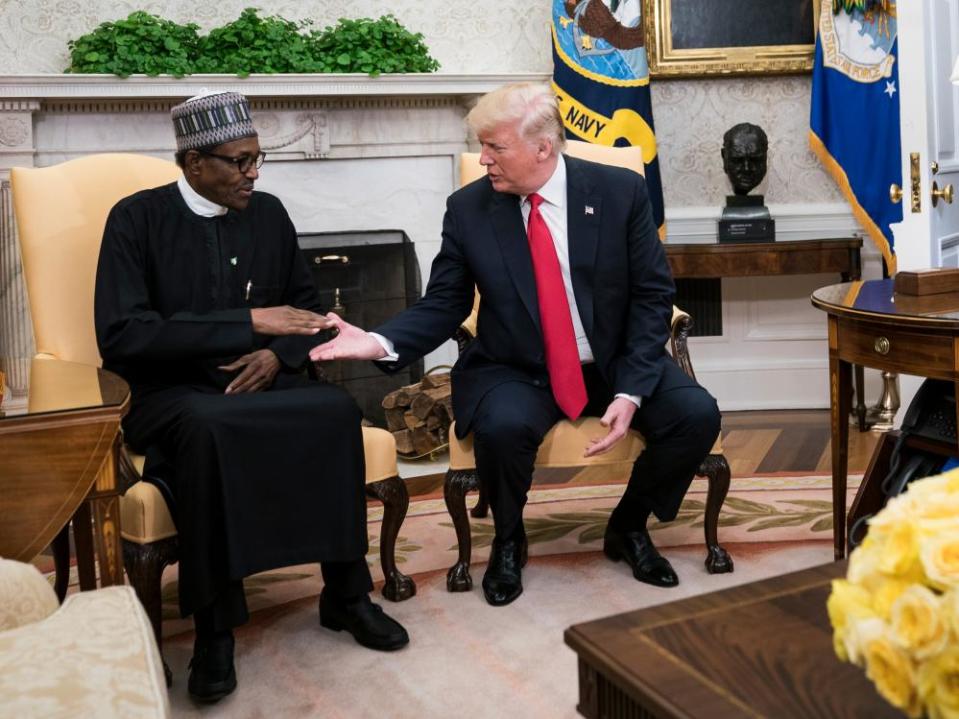'He just says it as it is': why many Nigerians support Donald Trump
The pursed, stony expression is familiar in Peter Odoakang’s striking oil painting of Donald Trump, but not the outfit. The US president is portrayed wearing a wine- and peach-coloured agbada and cap, traditional Yoruba attire, fitting him into the mould of a south-western Nigerian leader or “big man”, as Odoakang says.
“People see him in agbada and say wow, it fits him. People really laugh about it and react to it,” says Odoakang, 23, of the portrait commissioned by a company in Lagos, which he says brings Trump’s “personality into our setting”.
“I’ve been in many offices and seen pictures of Trump, but when you put him in our attire it starts to say something about Nigeria and his influence here,” he says.
Portraits of Trump have grown more common among the impressionist depictions of notable figures often sold from open stalls on the streets of Nigeria. In some images he is depicted in his normal suit, and in others in traditional Nigerian clothing or in the green military uniform of former Nigerian dictators. His image strikes a chord in a country where admiration for him is easy to find.

Pew research suggests 58% of people in Nigeria say they have confidence in Trump – the fourth highest total after the Philippines, Israel and Kenya.
Trump’s tightening of immigration laws, his reference to “shithole countries” in Africa, and widespread accusations of racism and Islamophobia might be assumed to be reasons for hostility towards him.
Yet, although perceptions of Trump vary across Nigeria’s diverse cultural and religious landscape, there is a large affinity towards him, fostered years before he entered politics when his larger-than-life image as a bombastic, straight-talking, self-made billionaire made his books a hit here.
“Trump’s popularity in Nigeria probably preceded his becoming president,” says Sa’eed Husaini, a political analyst in Lagos. “Judging by its popularity with traffic hawkers, The Art of the Deal has been a bestseller here for many years now.”
Husaini also notes similarities between Nigerian and US politics. “Judging by our own president, it isn’t entirely surprising that a septuagenarian economic nationalist with a born-again vice-president, minimal respect for rule of law and archaic views about women is popular in Nigeria.” Nigeria’s president, Muhammadu Buhari, is 76; its vice-president, Yemi Osinbajo, is a Pentecostal pastor.
At the Church and School Society bookshop in Lagos, the oldest in the country, books by stalwarts of US evangelicalism such as Billy Graham, Joyce Meyer and John C Maxwell line the shelves along with fiction and educational material. Gifted Hands, the autobiography of Ben Carson, the US housing secretary and former neurosurgeon, effusing on how his hard work, intelligence and deeply held faith helped lift him out of poverty, takes pride of place. Trump’s Art of the Deal and Think Big, regularly stocked by the store, are sold out, says the store’s procurement manager, Felix Abiodun. “They don’t stay on the shelves, they go too fast,” he says.
Abiodun believes Trump’s often abrasive, off-the-cuff style shows his authenticity. “Some people are careful with what they say, appear holy and do things in secret that you don’t know. But he just says it as it is,” he says.
To many in Nigeria’s Anglican community, Trump’s presidency came at a moment “ordained by God”, Abiodun says. “You can see it with the restoration of Jerusalem as the capital of Israel, which is what God said in his word, and it has now come to pass.”. Trump’s stated opposition to gay marriage further bolsters this sense, he says.
Trump is not universally popular among Christians in Nigeria, many of whom are critical of allegations of sexual abuse, financial misconduct and association with rightwing white nationalist groups. Yet, especially in Nigeria’s south, some of his most ardent supporters see a god-given imperative behind some of his controversial policies.
“With Obama, he prioritised gay rights, abortion, an Islamising agenda. Such policies were not good for America,” Abiodun says. Trump slogans such as “America first”, and policies that disadvantage Nigerian migrants, simply reflect that leaders should put their own countries first too, he says. “Our own leaders have not done that.”
Some criticism of Buhari, a Muslim from the country’s north where Islam is more dominant, has been spurred by religious concerns. Accusations of an “Islamisation agenda” and filling powerful positions with northern Muslim figures are common in media commentary.

As insecurity has spread in Nigeria, some influential groups have depicted complex communal and regional conflicts as religious warfare by Muslims against Christians and accused Buhari’s government of complicity. The growth of militancy among Buhari’s ethnic Fulanis has only fuelled simplistic narratives further.
Meanwhile, Trump’s outspoken criticism of Christian persecution has not gone unnoticed. In 2018 when Buhari visited the White House, Trump said: “We have had very serious problems with Christians who are being murdered in Nigeria. We are going to be working on that problem very, very hard because we cannot allow that to happen.”
Among Biafra secessionists in Nigeria’s south-east, support for Trump is often emphatic. When Trump tweeted in response to Britain’s EU referendum result in 2016 that “self-determination is the sacred right of all free peoples”, many pro-Biafran sites claimed it was veiled support for a Biafran state.
Trump is in many ways a useful avatar for many, embodying what they feel is missing in Nigeria.
Painting Trump helped attract attention to Odoakang’s craft, which he began when he was 12. “When you see him, he’s a proud figure,” he says, describing how he painted the president’s posture. “He speaks up and doesn’t hold back.”

 Yahoo Finance
Yahoo Finance 